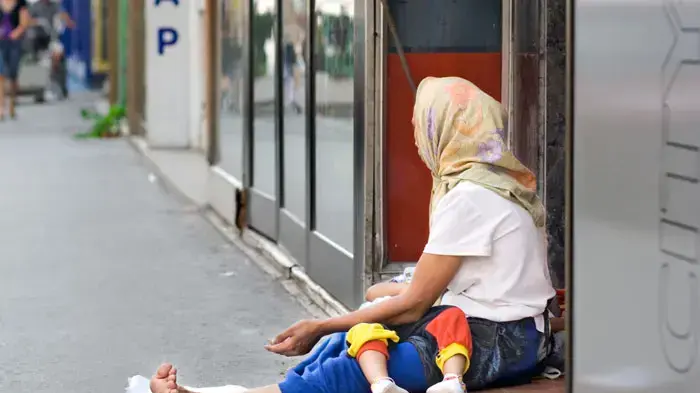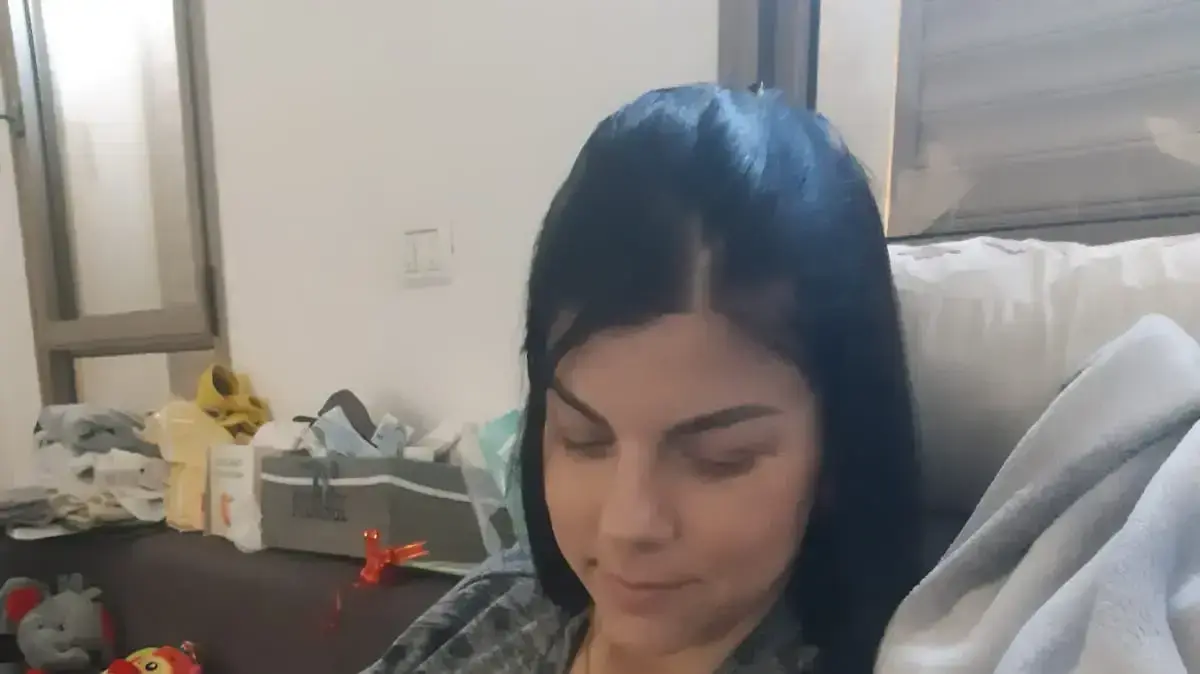Munich family says: It's so difficult to help Ukrainians - "Nice, but also frustrating time"
Created: 05/28/2022, 04:56
An unusual shared flat: Nikita (6) with his mother Valentina (from left), the couple Kathrin Kurz and Claus Lochbihler and their children Louis (7) and Magdalena (13).
©Oliver Bodmer
A Munich family took in a refugee Ukrainian mother and her six-year-old son for six weeks.
A "beautiful, but also frustrating time".
Munich – The farewell comes as suddenly as her arrival.
Six weeks after we took in Valentina (35) and Nikita (6) after a call from the “Munich Volunteers”, we take them to another host family.
From our apartment in Giesing to a village near Mindelheim.
We had celebrated the night before: our flat share-like living together, which remarkably often revolved around food.
About Ukrainian borscht, which Valentina loves to cook, and Bavarian meat loaf, which Nikita likes so much.
Hardly anything brings people together like eating together, especially when you can only talk using Google Translate.
The trip to the Allgäu feels like a defeat: We would have preferred to have brought Valentina and Nikita to their own small rental apartment in a few weeks.
Nevertheless, we are relieved: in mid-June our older daughter will be returning from her stay in France.
Then the room where Valentina and Nikita live is their room again.
Ukraine refugees in Munich: Difficult search for long-term accommodation
We also stated this date when we made the room available for three months.
But no one seems to really care about that deadline.
As we begin to look for long-term accommodation, we still believe that there must be someone who will take care of it.
The result is sobering - although I can invest a lot of time because I'm currently on parental leave.
If you call various hotlines, they say: “You can return them at any time.
But then they first come to the arrival center or an emergency shelter.” That's exactly what we want to spare Valentina and Nikita.
Another emergency shelter after fleeing Pokrovsk, a small town near Donetsk.
Five days or 2400 kilometers by train to Munich.
It was early March when Valentina decided to flee after a rocket hit the basement of her house.
So we start looking.
After small apartments or rooms for subletting.
The main thing is long-term.
Ideally close to us - realistically somewhere.
Friends and acquaintances offer to accommodate them for a few weeks – if all else fails.
At the same time we try to make it clear to Valentina that Munich is very nice, but unfortunately the housing market is really, really mean.
Ukraine refugees in Munich: The "Integreat" app is helpful when looking for an apartment
A friend says that a housing association rents to Ukrainian refugees.
Call there: "Yes, that's right.
Please write an e-mail.” The answer to my e-mail was that the apartments would be made available to the Munich District Office.
One may turn there.
This is what we do.
We ended up on the hotline three times: "Unfortunately I'm not allowed to put you through." "I'd like to put you through, but that's not possible technically." Third call: "I'll put you through." I end up on the answering machine of an employee, say my request, leave my number - and never get a call back.
So we keep looking.
The “Integreat” app, on which you can also find housing offers for Ukrainian refugees, has proven to be the most helpful.
Much is limited in time, some indefinitely.
We are hoping for an advertised granny flat in the north of Munich.
The friendly landlord has already received 30 requests.
If he doesn't get back in touch, the apartment has gone to someone else, he says on the phone.
He no longer reports.
Before we started looking for an apartment, we started dealing with the authorities.
All of a sudden we accompany Valentina every time – after all, she doesn’t speak English.
We use Google Translate, it works surprisingly well.
In the three months that we can accommodate Valentina and Nikita, we think there should be a lot to do with official duties.
But it takes four strenuous appointments with the district administration department and a visit to the federal police at the main train station before the two are registered and the IDs are processed.
Ukraine refugees in Munich: Finally success in the KVR
At the last, finally successful appointment, we even consulted Wikipedia to explain to the KVR employee that Pokrovsk used to be called Krasnoarmijsk.
Krasnoarmijsk is on Nikita's birth certificate.
But he fled Pokrovsk, as the city has been called since 2016.
At the end, the clerk explains to us why it took so long: there were far too few operational PIK stations.
PIK stands for - long word, please hold on!
– Personalization infrastructure component.
The federal government provides the system consisting of camera, document verification device and fingerprint scanner for registration and identity comparison.
Because of too few personalization infrastructure components, the registration took almost two months.
This is just the beginning of the German asylum, registration and social bureaucracy.
On the other hand, things are surprisingly uncomplicated in the community center.
Valentina gets paid money for April and soon for May, faster than expected.
Bar. In addition, treatment slips for the doctor.
And the note that from June 1st the job center will be responsible for her, so she absolutely has to open an account.
Ukraine refugees in Munich: Valentina worked in a bakery at home
Valentina buys clothes from one part.
And she insists on paying for her groceries herself.
Valentina likes to cook and bake.
In Ukraine she worked in a bakery and a pizzeria.
If we understood correctly, the bakery was already destroyed in the 2014 war with Russian separatists.
Likewise the water supply.
For five months, says Valentina, they had to get by without running water.
Her sister went to Germany in 2015, to the Eifel.
Valentina's parents also fled to her sister, in a much too small apartment.
Only Nikita's father, from whom Valentina lives separately, is still in Ukraine.
The school is just as uncomplicated and committed as in the community center: after two phone calls and a short meeting with the school director, Nikita is allowed to attend the elementary school for three hours a day.
One hour German, two hours regular with class 1c.
Time that Nikita enjoys, that he doesn't spend with videos on the laptop.
When Nikita proudly shows us his first letters in Latin script, it makes up for at least one unsuccessful visit to the authorities.
At the beginning of May, on “Integreat” we see an offer from a family with four children and a family home that would give Valentina and Nikita a room.
Indefinite.
Instantly.
We would like to have her with us longer, but we explain the situation to Valentina.
she says yes
In the Allgäu, Valentina and Nikita are greeted as warmly as one could wish for.
It feels good knowing they are with people who take good care of them.
Ukraine refugees in Munich: "I'm cooking borscht again"
Three days later, Valentina sends the message: "I'm making borscht again." A good sign.
Six days after moving out, the city of Munich's Citizens' Registration Office calls us: Now that you've successfully registered, you could offer an appointment to register your place of residence.
I explain that Valentina and Nikita have since found accommodation with another family and have already registered there.
The employee takes down the address and telephone number of the new host and patiently listens to my frustration with bureaucracy.
Her call and her interest reconcile me a little.
Will we take someone back if we have a room available?
I guess so.
One does learn.
About the people of Ukraine.
About themselves. That Ukrainians and Russians, and especially their children, often get along so well on the playgrounds in Munich as if there were no Putin and no war.
You also learn something about helping.
For example, that sometimes it is not so easy to walk the fine line between paternalism and helping.
And that helping a little is better than not helping at all.
Unfortunately, you also learn that the authorities don't necessarily make it easy to help - and officials suffer as a result.
It would be nice if it were different.
CLAUS LOCHBIHLER
INFORMATION HERE: Refugees and helpers can find out about contact points at muenchen.de/ukraine or by calling 089/ 126 99 151 00.
Russian delegations will not play a role at the World Economic Forum in Davos in 2022 - Ukrainians even more so. Selenskyj sends an appeal to the world: the news ticker on the Ukraine conflict.















